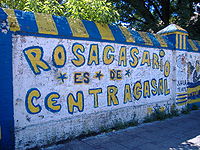
Rosarigasino
Encyclopedia

Language game
A language game is a system of manipulating spoken words to render them incomprehensible to the untrained ear. Language games are used primarily by groups attempting to conceal their conversations from others...
(in the form of a rhyming
Rhyme
A rhyme is a repetition of similar sounds in two or more words and is most often used in poetry and songs. The word "rhyme" may also refer to a short poem, such as a rhyming couplet or other brief rhyming poem such as nursery rhymes.-Etymology:...
slang
Slang
Slang is the use of informal words and expressions that are not considered standard in the speaker's language or dialect but are considered more acceptable when used socially. Slang is often to be found in areas of the lexicon that refer to things considered taboo...
) traditionally associated with the city of Rosario
Rosario
Rosario is the largest city in the province of Santa Fe, Argentina. It is located northwest of Buenos Aires, on the western shore of the Paraná River and has 1,159,004 residents as of the ....
, , even though very few people, if any, currently employ it.
It is similar to the much more common game of jeringonza
Jeringonza
Jeringonza is a Spanish language game played by children in Spain and all over Latin America. It consists of adding the letter p after each vowel of a word, and repeating the vowel. For example, Carlos turns into Cápar-lopos....
. The exact origins of this language remain uncertain, but scholars and historians agree that it was created in early 20th century by local prisoners to communicate with each other without being understood by guards.
Rosarigasino functions by adding two syllable
Syllable
A syllable is a unit of organization for a sequence of speech sounds. For example, the word water is composed of two syllables: wa and ter. A syllable is typically made up of a syllable nucleus with optional initial and final margins .Syllables are often considered the phonological "building...
s to each word by inserting the sequence -gas- immediately after the stress
Stress (linguistics)
In linguistics, stress is the relative emphasis that may be given to certain syllables in a word, or to certain words in a phrase or sentence. The term is also used for similar patterns of phonetic prominence inside syllables. The word accent is sometimes also used with this sense.The stress placed...
ed vowel and then repeating that vowel, followed by the rest of the word. The term rosarigasino itself is formed in this way, after the local residents' demonym
Demonym
A demonym , also referred to as a gentilic, is a name for a resident of a locality. A demonym is usually – though not always – derived from the name of the locality; thus, the demonym for the people of England is English, and the demonym for the people of Italy is Italian, yet, in english, the one...
(rosarinos). Other examples (with the added sounds in bold):
- colectivo ("bus") → colectigasivo
- Monumento a la BanderaNational Flag Memorial (Argentina)The National Flag Memorial in Rosario, Argentina, is a monumental complex built near the shore of the Paraná River...
("Flag Memorial") → Monumegasento a la Bandegasera - peatonal ("pedestrian street") → peatonagasal
- Calle CórdobaCórdoba Street (Rosario)Córdoba Street is one of the most important streets in Rosario, Santa Fe Province, Argentina. It runs east–west through the center of the city, from the coastal avenue by the Paraná River to the western limit of the urbanized area....
("Córdoba St.") → Cagasalle Cogasórdoba
In the city of Rosario there is a sort of Academia or Association of Gasó. Besides, in some places it is possible to purchase manuals or learning books. In 2005, a complete rosarigasino version of Cervantes'
Miguel de Cervantes
Miguel de Cervantes Saavedra was a Spanish novelist, poet, and playwright. His magnum opus, Don Quixote, considered the first modern novel, is a classic of Western literature, and is regarded amongst the best works of fiction ever written...
novel Don Quixote de la Mancha was published, entitled Don Quijogasote de la Magasancha and translated by Bernardo "Chiquito" Reyes.

